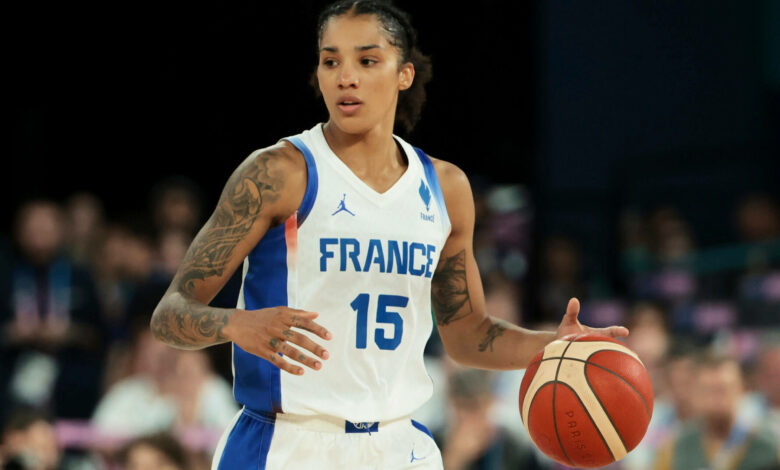Why isn’t Olympic medalist Gabby Williams in the WNBA? It’s complicated

Why isn’t Gabby Williams playing in the WNBA?
It’s a question Williams has faced too often over the past four years, and one that’s come to the forefront again following the former UConn guard’s dominant performance at the Paris Olympics. As Williams debates a return to the league she’s played in 135 games since 2018, the obstacles to her return raise important questions about player agency in the WNBA and what changes the players’ union should prioritize as it decides whether to opt out of the current collective bargaining agreement at the end of 2024.
Williams, who led France to a silver medal and averaged 15.5 points, 4.8 assists and 2.8 steals per game during the Olympics, entered the 2024 WNBA season as an unrestricted free agent. An ace perimeter defender throughout her professional career, she has honed her ballhandling and shot creation while playing in Europe and could immediately slot into a guard rotation for a contender.
But Williams has been an on-and-off member of the WNBA since 2021. She was unable to play that entire season and has faced prioritization challenges over the past two years. The players’ union has several priorities to address in a new CBA, including salaries, maternity protections (of particular importance in the wake of Dearica Hamby’s lawsuit) and revenue sharing. Williams’ experience also sheds light on player agency and autonomy, and what kind of freedoms players have earned after helping to build the league.
THE BEST of Xi’an 👑
Gabby Williams helped France sweep 🇫🇷 #FIBAOQT in Xi’an, averaging 16.3 PTS, 4.0 REB, 2.7 STL and 19.3 EFF and claiming the TISSOT MVP award ⚙️ photo.twitter.com/UALfRCwPCe
— FIBA (@FIBA) February 12, 2024
During the 2024 midseason, Williams opted to spend the first half of the season preparing for the Olympics rather than signing with a team. Because she retained her free agent status and completed her European club season before May 1, Williams is not restricted by the WNBA’s priority clause, which requires players competing internationally to report at the start of the WNBA calendar (even if their overseas team is still playing) or face being suspended for the season. She could opt to play the remainder of the season in the United States, provided a team has a roster spot and cap space available. Even with the WNBA trade deadline looming on Tuesday, Williams is likely the most impactful addition a team can make before the end of the regular season.
However, as originally reported by Rachel Galligan on X and confirmed by The AthleticsWilliams is considering a return to the WNBA this season because of the impact it would have on her 2025 options. If Williams simply chooses to skip the WNBA in 2024 (she is already under contract to play for Turkish powerhouse Fenerbahce for 2024-25), she would once again be an unrestricted free agent in the 2025 offseason and have full control over where she plays in the league next year. If she signs for the remainder of the season, however, that team would have the opportunity to core Williams and retain her exclusive negotiating rights for 2025.
WNBA teams have the option to designate a free agent as a core player during the offseason. The player can then negotiate with the team only as a free agent and is guaranteed a one-year supermax contract unless the two sides agree to a deal with different terms or a trade.
The purpose of the core provision was to give teams the ability to protect their investment in a player. After drafting, developing and investing in a player, the core gives franchises another mechanism to retain top talent in their organizations. However, it also inherently limits the player’s freedom, which has inadvertently been the story of Williams’ WNBA career.
In 2021, Williams was scheduled to miss part of the season to compete for France at EuroBasket and the Tokyo Olympics. Although she was expected to return to the United States once her international commitments were complete, Chicago Sky suspended her for the entire season, meaning she would not be paid her WNBA contract. In 2023, the priority clause would have prevented Williams from playing for the Seattle Storm, as her French season ended after the start of the WNBA calendar. She was ultimately only able to play for the Storm due to an unexpected turn of events; she suffered a concussion in France, ending her European season prematurely and making her available for Seattle.

GALLING DEEPER
Why is Gabby Williams the first test case for the WNBA’s prioritization rule?
Now Williams sees her autonomy threatened by another provision of the CBA: the core.
Williams’ case challenges the core determination theory. She is not a franchise player. If she returns to the WNBA, it will be to a team that didn’t draft her and didn’t give her any marketing money because she’s always overseas during the offseason. The only investment a team would have in her would be the $20,000 or so she gets for about a dozen regular-season games to close out the season. And for that limited period, a team could dictate where she plays in 2025.
While the WNBA is growing in size and generating more revenue, the CBA still exists to protect the interests of the teams, not the players. Mechanisms such as limited free agency, a hard cap, and the core restrict players’ markets and their ability to seek situations of their own choosing.
As a result, players are forced to make difficult decisions that often discourage them from playing in the WNBA. Priorities force a choice between playing overseas and in the U.S., and overseas contracts often eclipse what the best players can earn in the U.S. Elena Delle Donne was cut by the Washington Mystics this offseason and the veteran is now sitting out despite reportedly expressing interest in playing elsewhere, so the WNBA is missing one of the last healthy seasons of a two-time MVP.
Williams could stay in France and bask in the glory of her silver medal for a month before heading to Turkey. Instead, the decision to help a team chase a WNBA title could be a game-changer, putting her WNBA career in the hands of an outside actor once again. Professional experience should prioritize players, not force them to rely on the promises and goodwill of organizations. The reason Williams isn’t in the WNBA is because she’s trying to control her career, and the league’s CBA is trying to control her.
(Photo: Jean Catuffe/Getty Images)




